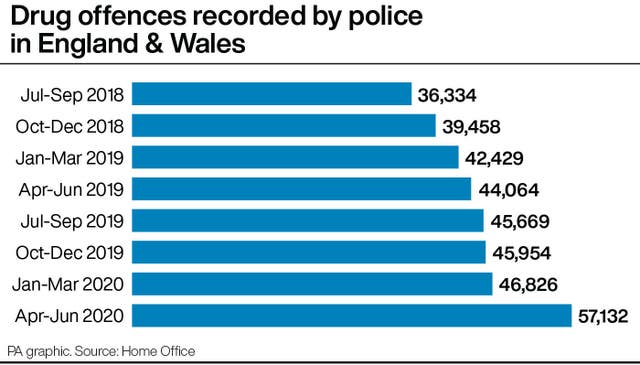Drug offences rose by 30% during lockdown while most other types of crime recorded plummeted as a result of the coronavirus pandemic, official figures show.
Police-recorded drug crimes in England and Wales rose from 44,064 in April to June 2019 to 57,132 during the same period this year, according to the Office for National Statistics.
Between January and March 2020, 46,826 drug offences were recorded.
The figures are an exception to the general trend, which shows the levels of most other types of crime falling as the pandemic took hold, according to an ONS report published on Wednesday.

Overall, the total number of crimes recorded by police in England and Wales fell by 4% to around 5.8 million in the year to June.
The ONS said: “Police-reported crime levels were relatively stable from July 2019 to March 2020 and the annual decrease was mainly driven by substantial falls during the April to June 2020 period, particularly in theft offences.”
Billy Gazard, from the ONS centre for crime and justice, said the drop in crime levels were “mainly driven by changes in society after coronavirus lockdown restrictions were put in place.”
He added: “The most substantial reductions were seen in theft and robbery offences during the April to June quarter.
“There are indications that crime levels in June were moving back towards pre-lockdown levels.”
But he said police recording of drug offences “increased sharply throughout the April to June period, reflecting proactive police activity as overall crime levels reduced”.
Anti-social behaviour also rose, he said, adding that this included reported breaches of lockdown restrictions to police.
There was a 9% fall in firearms offences (to 6,228) in the year to June and a 1% drop in those involving knives or sharp instruments (to 47,349 offences), which were driven by “substantial decreases in the April to June 2020 period”, the ONS report said.
It added that the annual decrease in offences involving knives or sharp instruments can be “wholly attributed to the large decrease seen in the lockdown period” when offences fell by 21% between April and June compared to the same period last year (from 12,237 to 9,617 offences).
But the number of homicides involving a knife or sharp instrument still rose by 2% in the 12-month period from 257 to 262 offences.
The number taking place in London rose by 14%.
This meant, of all recorded homicides in the latest year, 38% involved a knife or sharp instrument.
The total number of homicides also rose by 9% in the year to June from 668 to 725. This figure includes the bodies of the 39 Vietnamese people found in a lorry in Essex in October. Excluding this, the number would have risen by 3%.




Comments: Our rules
We want our comments to be a lively and valuable part of our community - a place where readers can debate and engage with the most important local issues. The ability to comment on our stories is a privilege, not a right, however, and that privilege may be withdrawn if it is abused or misused.
Please report any comments that break our rules.
Read the rules here